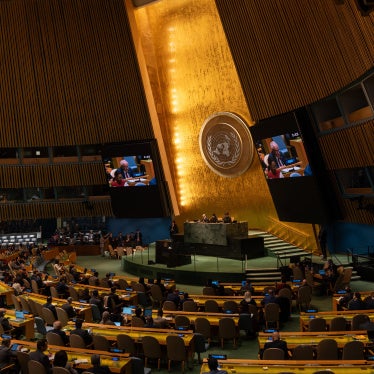This year’s session of the Commission on Human Rights ended today without addressing a number of the most disturbing human rights situations which afflict the world, Human Rights Watch said. This confirms the recent assessment by the Secretary-General that the U.N. Commission on Human Rights needs to be replaced with a new and more effective body.
Within the first week of the commission’s six-week meeting, several governments, including the European Union, United States, and Canada, announced their intention to not introduce resolutions critical of some of the world’s key human rights violators, such as China, Iran, the Russian Federation in Chechnya, Turkmenistan, Uzbekistan, and Zimbabwe.
“This year’s commission was hugely disappointing from its outset,” said Joanna Weschler, U.N. advocacy director for Human Rights Watch. “This session has been a powerful demonstration of the need to scrap the commission and replace it with something new and better.”
On a more positive note, the international community overwhelmingly approved the appointment of a special rapporteur on human rights and counterterrorism, with nearly 80 countries signing on, including the United States and Russia. The special rapporteur’s mandate, to monitor states’ compliance with human rights in the way they battle terrorism, was pushed forward thanks to the tireless efforts of Mexico.
“This is one of the most important steps the Commission on Human Rights has taken this year,” Weschler said.
On another positive note, Switzerland, one of the United Nations’ newest members, successfully led negotiations with the government of Nepal that resulted in an agreement to deploy a substantial U.N. human rights operation throughout the country. That operation will monitor violations by both sides in the brutal conflict between the government and Maoist insurgents. Nepal’s government also committed itself to taking concrete steps in the coming year to address the deteriorating human rights situation after King Gyanendra took power in a coup d’etat on February 1.
“Actions by Switzerland and Mexico at the commission demonstrate that new actors are promoting the human rights agenda in the face of reluctance from traditional players such as the European Union,” Weschler said.
Cuba’s resolution demanding that the United States provide access to terrorist suspects detained at Guantánamo Bay was defeated at least in part owing to the resolution’s sponsor, rather than its text. Cuba itself has consistently refused to allow the high commissioner’s personal representative to visit the island or any other rapporteurs to visit detainees in its own prisons.
“The international community should not shy away from addressing the issue of the legality and treatment of detainees held by the United States at Guantánamo,” said Weschler. “The United States should grant the U.N. special rapporteurs access to Guantánamo Bay, Iraq, Afghanistan and other detention locations.”
Following last minute negotiations between the European Union and the African Union, the commission adopted a compromise text on the situation in Sudan with the endorsement of the Sudanese government. While the language of the resolution was watered down somewhat to win the Sudanese government’s consent, it does notably call on all parties to the conflict to cooperate fully in the implementation of Security Council resolutions, including Resolution 1593, which referred the situation in Sudan to the International Criminal Court. The Sudan resolution also condemns “continued, widespread and systematic violations of human rights and international humanitarian law as reflected in the findings of the International Commission of Inquiry on Darfur.” The Commission of Inquiry’s report expressly found the government of Sudan responsible for such violations.
Despite strong opposition from the United States and Australia, other members of the international community came together to create a new mandate for a special representative of the secretary-general on business and human rights, setting in motion a two-year process to analyze corporate accountability standards and make recommendations. The work carried out under this mandate can helpfully contribute to strengthening these standards and their implementation.
The commission also passed resolutions renewing human rights monitoring of North Korea, Myanmar, Cuba and Belarus.
The commission, in its resolution against torture, firmly stated for the first time that governments must not send back terror suspects to abusive countries where they risk torture, a step that responds to the growing practice by some governments in Europe and North America.
Strong language on the protection of people on the grounds of sexual orientation was retained in the resolution on extra-judicial executions. However, an attempt to explicitly condemn extrajudicial killings of transgender people, a frequent phenomenon in some countries, was blocked. At the same time, the commission maintained its silence on the human rights abuses relating to sexual orientation and gender identity in other contexts, despite strong calls by non-governmental organizations for a resolution on this subject.
“Even though the commission took some positive steps, overall it was even more timid than in preceding years,” Weschler said. “This only confirms the need to replace the commission with a body that would take more decisive action against human rights violations wherever they occur, respond to human rights crises, and be ready to follow up on commitments made by violating countries.”






